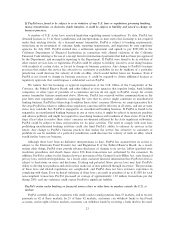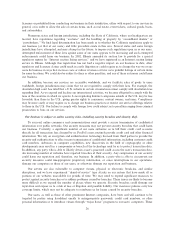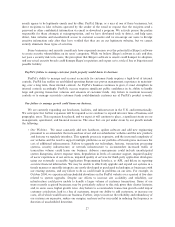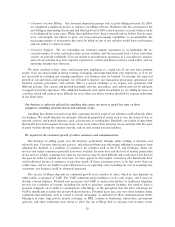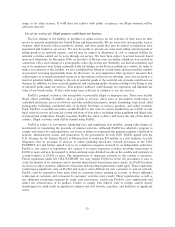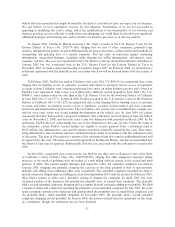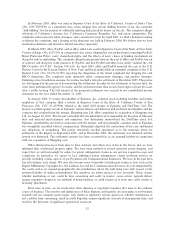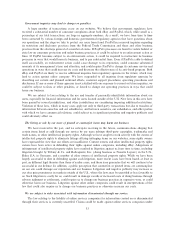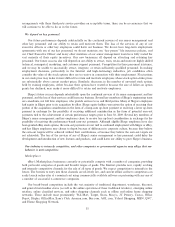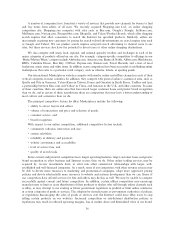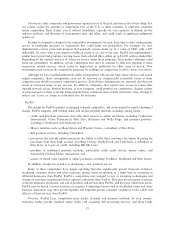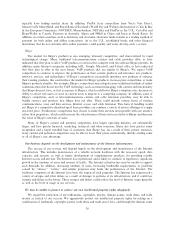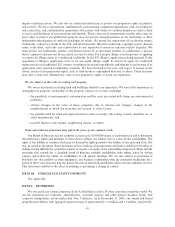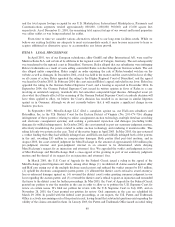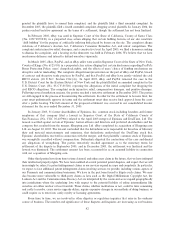eBay 2005 Annual Report Download - page 37
Download and view the complete annual report
Please find page 37 of the 2005 eBay annual report below. You can navigate through the pages in the report by either clicking on the pages listed below, or by using the keyword search tool below to find specific information within the annual report.Government inquiries may lead to charges or penalties.
A large number of transactions occur on our websites. We believe that government regulators have
received a substantial number of consumer complaints about both eBay and PayPal, which, while small as a
percentage of our total transactions, are large in aggregate numbers. As a result, we have from time to time
been contacted by various foreign and domestic governmental regulatory agencies that have questions about
our operations and the steps we take to protect our users from fraud. PayPal has received inquiries regarding
its restriction and disclosure practices from the Federal Trade Commission and these and other business
practices from the attorneys general of a number of states. If PayPal's processes are found to violate federal or
state law on consumer protection and unfair business practices, it could be subject to an enforcement action or
fines. If PayPal becomes subject to an enforcement action, it could be required to restructure its business
processes in ways that would harm its business, and to pay substantial fines. Even if PayPal is able to defend
itself successfully, an enforcement action could cause damage to its reputation, could consume substantial
amounts of its management's time and attention, and could require PayPal to change its customer service and
operations in ways that could increase its costs and decrease the effectiveness of its anti-fraud program. Both
eBay and PayPal are likely to receive additional inquiries from regulatory agencies in the future, which may
lead to action against either company. We have responded to all inquiries from regulatory agencies by
describing our current and planned antifraud efforts, customer support procedures, operating procedures and
disclosures. If one or more of these agencies is not satisfied with our response to current or future inquiries, we
could be subject to fines or other penalties, or forced to change our operating practices in ways that could
harm our business.
We are subject to laws relating to the use and transfer of personally identifiable information about our
users, especially for financial information and for users located outside of the U.S. New laws in this area have
been passed by several jurisdictions, and other jurisdictions are considering imposing additional restrictions.
Violation of these laws, which in many cases apply not only to third-party transactions but also to transfers of
information between ourselves and our subsidiaries, and between ourselves, our subsidiaries, and other parties
with which we have commercial relations, could subject us to significant penalties and negative publicity and
could adversely affect us.
The listing or sale by our users of pirated or counterfeit items may harm our business.
We have received in the past, and we anticipate receiving in the future, communications alleging that
certain items listed or sold through our service by our users infringe third-party copyrights, trademarks and
trade names, or other intellectual property rights. Although we have sought to work actively with the owners of
intellectual property rights to eliminate listings offering infringing items on our websites, some rights owners
have expressed the view that our efforts are insufficient. Content owners and other intellectual property rights
owners have been active in defending their rights against online companies, including eBay. Allegations of
infringement of intellectual property rights have resulted in litigation against us from time to time, including
litigation brought by Tiffany & Co. and Robespierre, Inc. (doing business as Nanette Lepore) in the U.S.,
Rolex S.A. in Germany, and a number of other owners of intellectual property rights. While we have been
largely successful to date in defending against such litigation, more recent cases have been based, at least in
part, on different legal theories than those of earlier cases, and there is no guarantee that we will continue to be
successful in our defense. In addition, a public perception that counterfeit or pirated items are commonplace
on our site could damage our reputation and our business. Litigation and negative publicity may increase as
our sites gain prominence in markets outside of the U.S., where the laws may be unsettled or less favorable to
us. Such litigation is costly for us, could result in damage awards or increased costs of doing business through
adverse judgment or settlement, could require us to change our business practices in expensive ways, or could
otherwise harm our business. Litigation against other online companies could result in interpretations of the
law that could also require us to change our business practices or otherwise increase our costs.
We are subject to risks associated with information disseminated through our service.
The law relating to the liability of online services companies for information carried on or disseminated
through their services is currently unsettled. Claims could be made against online services companies under
33


